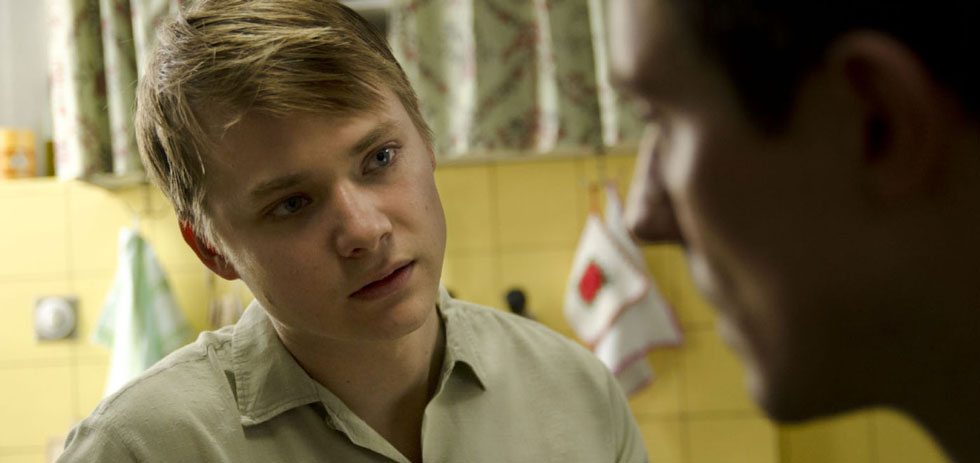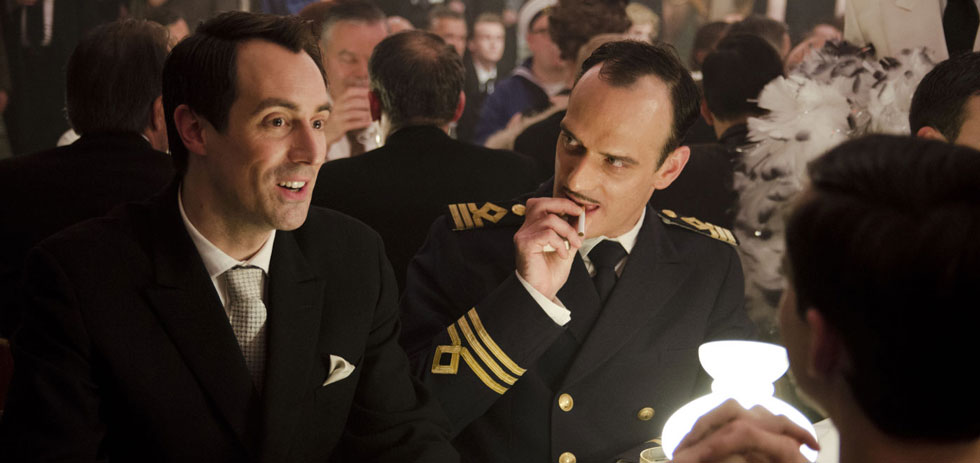
The 2015 Berlinale wound down last week and we’re playing catchup, with one of the best received documentaries of the 2014 Berlinale finally screening in Australia, courtesy of Queer Screen’s Mardi Gras Film Festival. Stefan Haupt’s The Circle won the Teddy Award for Best LGBT Documentary Feature at the 2014 Berlinale, and was also the official Swiss submission to this year’s Academy Awards for Best Foreign Language Film, its litany of accolades an encouraging sign both for its form, as a surprisingly successful docudrama, as its content, with the national selection for the Oscars a very interesting acceptance on the part of Switzerland of its treatment of homosexuals in the ’50s and ’60s.1
The Circle centers itself around the relationship between Ernst Ostertag (Matthias Hungerbühler), a schoolteacher, and Röbi Rapp (Sven Schelker), a drag performer, who meet as a result of their involvement in the running of Swiss bimonthly gay magazine Der Kreis (trans. The Circle).2 As in many great romances, they appear ostensibly as opposites; the reserved Ernst and the outgoing Röbi, Ernst from a conservative family, Röbi a wholly accepting one, the studious writer and the emotional performer. What prevents this idea and many narrative strands within The Circle from overreaching or feeling a little too simplistic is the fact that, as a docudrama, these sequences are intercut with interviews of Ernst and Röbi themselves, now in their mid-80s. There’s an intimacy on display in these interviews that grounds the more sweeping plot points whilst also lifting the emotional highs. They look adoringly at one another as they speak; minor quibbles about how long it took for introductions to each others’ parents make you momentarily forget there’s an important historical narrative in play, you’re swept up in their lifelong romance.
The dramatic elements organically flow from the interviews rather than feeling tacked on, Haupt’s decision not to have narration underline the emotional importance of select scenes, and to essentially have the interview and dramatised versions run parallel to one another, is an appealing mix.3 This lack of direct re-creation also shows us that Haupt doesn’t necessarily want perfectly intertwined fact and fiction, but rather an illustrative reflection, an imaginative representation with slight embellishment. It is a love story, after all.4
It’s also refreshing to see something akin to a biopic about people whose accomplishments and achievements aren’t widely known or regarded. That said, late in the film it’s revealed exactly why Ernst and Röbi are very notable Swiss citizens, and the fact that Haupt chooses not to frame the entire film around this is a rewarding act of restraint on his part. As a result, The Circle becomes a narrative celebrating a great love rather than the greatness of individuals. In the vein of many biopics, though, we spend a lot of time learning about Zürich’s place in the movement for gay rights in post-war Europe. The film tells us that the lack of any laws punishing homosexuality in Switzerland led to Zürich becoming a continental hub for gay men, an oasis from legislative regimes that echoed pre-war Nazi Germany policy on gay individuals, and that the Der Kreis was integral in this sense of place, sending copies of their magazine all across Europe.

Whilst, at points, Zürich is seen as a more open and accepting community, that’s all relative, as we see when the film begins to focus less on romance than social ostracisation. The sparse usage of archival footage, at first merely as establishment, then becomes very effective in shattering historical illusions. At one point, as we see a picturesque shot of the city of Zürich from over 50 years ago, in voiceover (the real-life) Ernst describes how “groups of thugs” would beat his friends, and that all of the gay men in Zürich lived under constant threat of violence.A major plot element is a string of murders of homosexual men, one of them a close friend of Ernst and Röbi’s, which sees the general public and institutions of power paint homosexuality as a mortal danger. The police use it as a tool to infiltrate and dismantle LGBT-friendly organisations and institutions, whilst the courts, in one documentary element, are revealed to have released one of the murderers, accepting the defense’s argument that homosexual coercion forced him to kill. The casual bigotry of Ernst’s fellow schoolteachers in dramatised scenes is often just as powerful as these factual accounts, reflecting entrenched prejudice that still exists today.
Whilst the docudrama mesh works much better than many films of that ilk, The Circle‘s attempts to deal with a more broad overview of gay rights in Europe and the closure of Der Kreis itself comes off as quite rushed and underdeveloped. It also suffers from a tendency to string out too many subplots; though the way it approaches sexual partnerships and the way they impact on the relationships within the office of Der Kreis is impressive in its brevity, less successful is a subplot involving Ernst’s boss, whose personal narrative intertwines with the broader political one in a way that feels forced and convenient.5
Despite some minor narrative flaws, The Circle is a frequently moving and ultimately engaging film that shines a light on a unique story with wide implications regarding sexual identity and social acceptance. It narrows its target nearing the end, hitting a surprisingly profound note surrounding the debate over same-sex marriage. A recurring vignette suddenly becomes more important, Röbi in the present day, dressed in drag, standing on stage and performing an old poem written by Ernst as a song. At the start of the film we cut to Ernst’s face in the crowd, he’s beaming, his enchantment teleporting him back to his youth. When it’s repeated at the end, there’s no cut to audience, because this time it’s the viewer. We’re given a window into a passionate love that the film champions, and by the end of its runtime, you’ll be championing it too.
